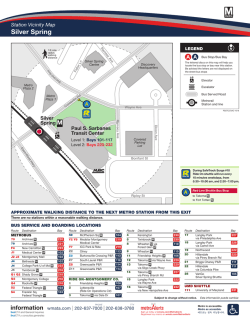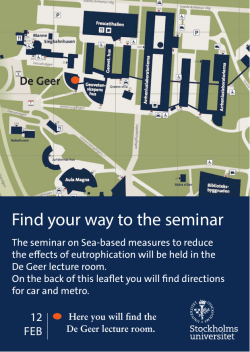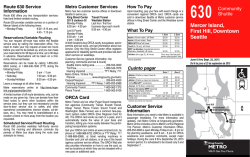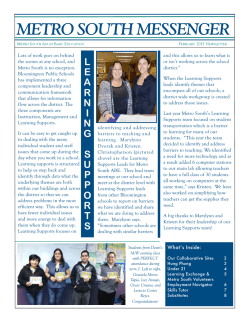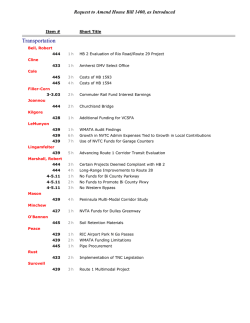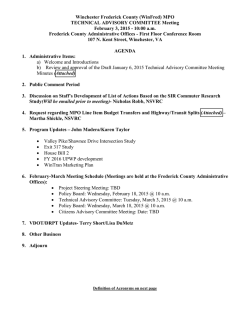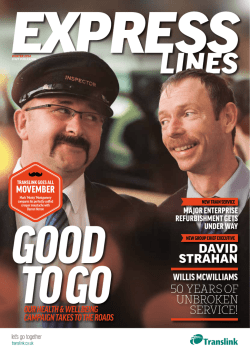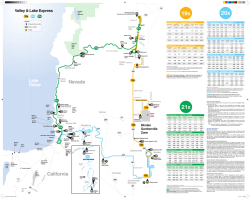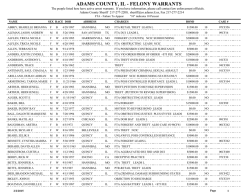
Presentation - House Appropriations Committee
Washington Metropolitan Area Transit Authority Washington Metropolitan Area Transit Authority Overview and Financial Update Virginia House Appropriations Subcommittee on Transportation February 2, 2015 WMATA Overview • The Washington Metropolitan Area Transit Authority (WMATA) was created in 1967 by an Interstate Compact • WMATA was created by DC, MD and VA (“signatories”), with the consent of Congress • WMATA began operation in 1976 2 Serving the National Capital Region • Metro serves a population area of over 3.9 million within a 1,500 square-mile radius • Board governed by eight voting and eight alternate directors • The District of Columbia, Maryland, Virginia and the federal government appoint two voting and two alternate members each 3 Metro Keeps the Region Working • 54% of the Washington DC region’s two million jobs within ½ mile of Metro • The $235B of property at Metrorail stations generates $3.1B annually in jurisdiction tax revenues • Within ½ mile of Metrorail stations, VA collected $470M in property tax revenue in 20101 1. “Making the Case for Transit: WMATA Regional Benefits of Transit, November 2011 4 What if there were no Metro? More cars on the road More lanes More parking spaces More congestion More money spent on auto expenses • Poorer air quality • • • • • 5 Metro’s Value to Virginia • Metrorail provides 40.97 total miles of rail in VA with 25 stations – Will be 52.37 miles and 31 stations with full extension to Dulles Airport and Loudoun County – Provides approximately 211,000 average weekday trips to Northern Virginia residents • Metrobus operates 48 bus lines serving Virginians – 65,000 average weekday riders in five Northern Virginia jurisdictions • MetroAccess provides shared ride, door-to-door paratransit service to over 1,200 customers in Northern Virginia on an average weekday 6 FY 15 State Funding for Metro State Funding FY 15 Allocations Operating: Match to NVTC Jurisdictions $99.6M Capital: Match to NVTC Jurisdictions $42.1M Capital: PRIIA (federal Passenger Rail Investment and $50.0M Improvement Act of 2008 to support safety and state of good repair) Capital: Metro 2025 Program (supporting 8 car trains, expanding high volume stations, and improving bus network) $9.0M TOTAL $200.7M 7 Rebuilding the Foundation Metro Forward: $5 billion, six-year investment program 8 M om entum Delivers Metro 2025 Longest possible trains to provide more seats More cars + power improvements and maintenance facilities to operate all 8-car trains during rush hours Improved flow through major stations More escalators, stairs and mezzanine space added at transfer Stations to accommodate more riders more comfortably More reliable, faster bus service Bus-only lanes along major corridors, additional limited-stop and express service, and more buses will upgrade bus service 9 Silver Line Update • Silver Line Phase 1 service began July 26, 2014 • Seeing over 15,000 boardings on an average weekday at the five new Silver Line stations • Achieving over 60% of the ridership projected for the end of the first year • Wiehle Station and Tysons Corner doing particularly well Picture courtesy Dulles Transit Partners 10 Progress Toward Addressing Federal Oversight Review • WMATA received a final Financial Management Oversight (FMO) report from the Federal Transit Administration (FTA) on June 10, 2014 • The FMO review identified nine findings, five advisory comments, and a total of 45 recommendations • WMATA committed to 65 Corrective Action Plan (CAP) items in response to FTA’s findings • WMATA has made significant progress and documentation has been submitted by WMATA for 62 of the 65 CAPs 11 Progress Toward Addressing Federal Oversight Review (cont’d) • Of the three outstanding CAPs • Two material weakness CAP submissions, originally due September 8, 2014, have been extended to June 30, 2015 • An advisory comment CAP has a committed due date of June 30, 2015 • The outstanding CAPs deal with reconciliation and revision of federal grants, which require complex and meticulous work to ensure accuracy • FTA recognized the complexity and granted the extension 12 Focus on Procurement and Grants Management Reforms • Focus on procurement reforms to ensure adherence to federal procurement regulations and ensure they are conducted with “full and open competition” • Revisions to procurement and grants management policy is a top priority of WMATA and training has been completed for all current, relevant employees • 448 employees trained on updated procurement policies • 267 employees trained on updated grants management • Focus on long term compliance monitoring to ensure implementation; will use compliance monitoring software 13 Thank You! WMATA appreciates the support of the General Assembly and the Commonwealth of Virginia 14
© Copyright 2026
